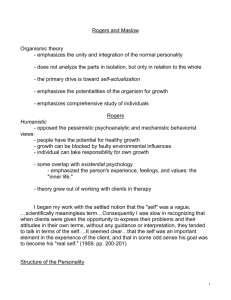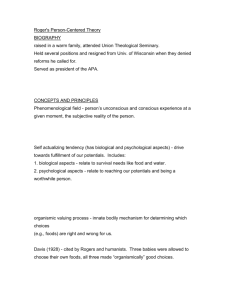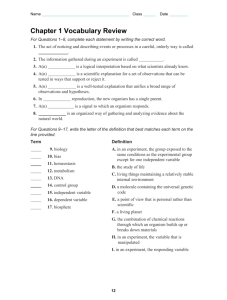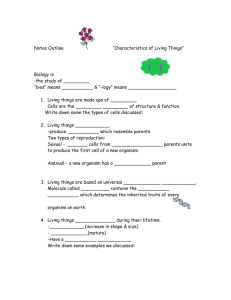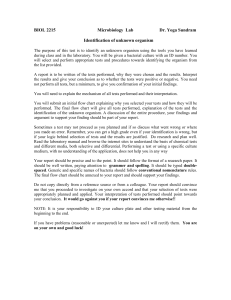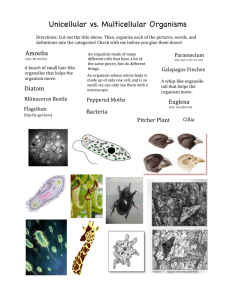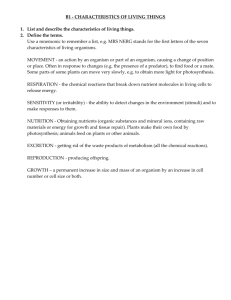here - Persona Counselling
advertisement
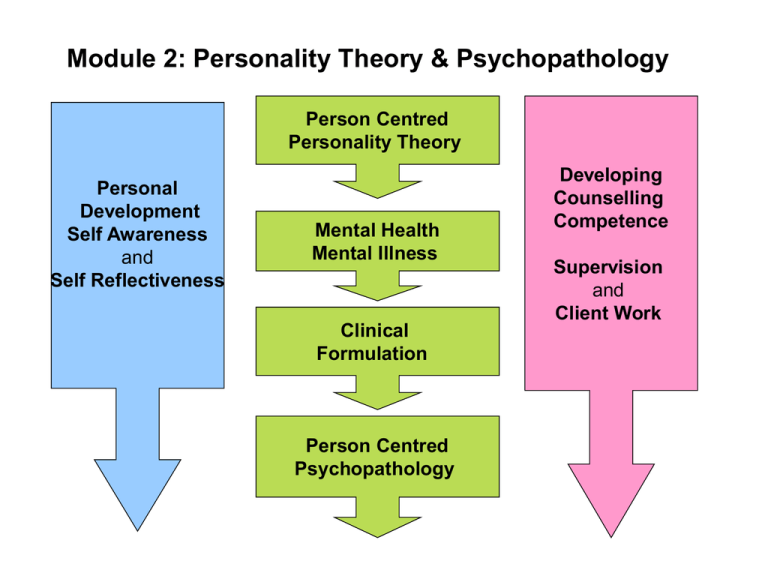
Module 2: Personality Theory & Psychopathology Person Centred Personality Theory Personal Development Self Awareness and Self Reflectiveness Mental Health Mental Illness Clinical Formulation Person Centred Psychopathology Developing Counselling Competence Supervision and Client Work Person Centred Personality Theory the foundation of person-centred practice A theory about: A) How we develop into functioning people (model of ‘normal’ development) B) How we come to experience distress (model for ‘psychological’ distress and disturbance) C) How we get from B to A (model for therapeutic change) (Sanders) Part 1: Development Will include key concepts such as A Phenomenological Approach The Organismic Valuing Process The Actualising tendency Self Structure/Self Concept Conditionality and the need for Positive Regard The development of Conditions of Worth Locus of evaluation - internalised and externalised Part 2 - Distress & Disturbance Will include key concepts such as Symbolisation – how we create meaning Denial and Distortion – how we protect ourselves Incongruence - the development of Disturbance Process of Breakdown Configurations of Self (your evening session) Part 3 Re-integration and Change This will include key concepts such as: • Process of integration & change • The Fully Functioning Person • Personality as an ongoing process • Implications for Practice A Theory of Personality “If theory could be seen for what it is - a fallible, changing attempt to construct a network of gossamer threads which will contain the solid facts; - then a theory would serve as it should; as a stimulus to further creative thinking” Carl Rogers. Client Centred Therapy 1959, p.191 Your personal theory What do you think…… A. How do we develop into functioning individuals - what is involved? B. How come some individuals experience severe levels of distress whilst others don’t – what happens? C. How do these individuals get themselves back together again – what is involved? D. What questions do you have? A Person Centred Theory of Personality A Characteristics of the Human Infant – propositions 1-7 B The Development of the Self – proposition 8 & 9 C The Need for Positive Regard – proposition 9 D The Development of the Need for Self Regard – proposition 9 E The Development of Conditions of Worth – proposition 10 A Phenomenological Approach • Phenomenology is the study of subjective experience • The total reality of conscious experience • Dedicated to describing the structures of experience as they present themselves to consciousness • To truly understand ourselves we need to turn our attention to our conscious ‘lived experiences’ 1. Every individual exists in a continually changing world of experience of which he/she is the centre A Perceptual Theory • PERCEPTION IS REALITY • We cannot separate ourselves from our perceptions of the world • We can all see, hear, experience the same event but my response/reaction will be different than yours • Meaning is in the experiencing – not an interpretation 2. The organism reacts to the field as it is experienced and perceived. This perceptual field is, for the individual, 'reality ’. An Organismic Theory • I respond as a ‘whole system’ and react in my entirety to my perceptions. • I react with my whole self – physical, emotional, psychological, cognitive • My reaction to the “psychological” will also be physical • There is one basic drive which emerges from the “wholeness” of the organism. 3. The organism reacts as an organised whole to this perceptual field The Actualising Tendency • A directional tendency of enhancement • The organism is driven to grow towards fulfilment • It is as constant and universal as 'gravity'. (Merry) • Where it finds what it needs it is nourished and “actualisation” occurs • When it doesn’t find what it needs, it will continue to seek and find other things • This forward-moving tendency is the basis upon which the therapist relies most deeply and fundamentally. 4. The organism has one basic tendency and striving -to actualise, maintain, and enhance the experiencing organism Behaviour is purposeful • I'll behave in whatever way it takes to get my needs met • If I feel (perceive) I need something, I’ll attempt to get it - whether or not it maintains or enhances the organism in the longer term • Behaviour is prompted by present perceptions – not the past • As a result of value based ‘introjections’ we sometimes seek things that do not lead to actualisation 5. Behaviour is basically the goal oriented attempt of the organism to satisfy its needs as experienced, in the field as perceived. Behaviour & Emotion • If something matters to me I will feel strongly about it. • The stronger my need or repulsion is, the stronger my feelings will be • The strength of my emotion will parallel the strength of my need • Negative emotions are linked to trying to satisfy need. • Positive emotions are linked to need being fulfilled 6. Emotion accompanies and in general facilitates such goaldirected behaviour, the kind of emotion being related to the seeking versus the consummatory aspects of the behaviour, and the intensity of the emotion being related to the perceived significance of the behaviour for the maintenance and enhancement of the organism Behaviour & Understanding • You see what I am doing and know its impact on you • But if you only evaluate it from this point of view you will not fully understanding its meaning • I give meaning and value to my actions • If you want to understand my behaviour you need to understand my valuing/meaning processes • This is a clear anti-Freudian stance and refutes the idea of interpretation 7. The best vantage point for understanding the individual is from the internal frame of reference of the individual himself Break Becoming a ‘Self’ • Initially the organism simply experiences discomfort/pain or comfort and contentment. • As the infant develops needs and experiences become “differentiated”; ‘hunger’, pleasure, pain, frustration, fear, comfort. • The organism starts to gain an awareness of functioning and a “Me” who is functioning (ie a self-experience). The organism becomes ‘SelfConscious’ • The organism actualises its 'self' just as it actualises its physical 'self‘ (Merry) 8. A portion of the total perceptual field gradually becomes differentiated as the self. ‘Me’ & Positive Regard • An awareness of self emerges in relation to others and to the environment. • This awareness is accompanied by a need for Positive Regard. • Positive Regard nourishes it and sustains the ‘self’ • Positive Regard comes explicitly from others. • Direct organismic valuing is at work in relation to self (Me) others and the environment • As this valuing process drives behaviour and interaction, patterns emerge and a “Concept of Self" (the idea of ‘Me’) emerges Positive Self Regard • The need for positive regard from significant others is compelling • Positive regard experiences become internalised and independent of interactions with others = Self-Regard • We become our own significant “social other” • We find ways to feel good about ourselves independently of others Conditionality Receiving positive regard from significant others can become more compelling than the organismic valuing process The child can become more influenced by this than by experiences which are of positive value in actualising the organism I experience pulling sister’s hair as a good thing - but I am severely scolded and find out it is a bad thing. Is it bad or good? Positive Regard & the ‘Self’ 9. As a result of the interaction with the environment, and particularly as a result of the evaluational interaction with others, the structure of self is formed – an organised, fluid, but consistent conceptual pattern of perceptions of characteristics and relationships of the ‘I’ or the ‘me’, together with values attached to these concepts Conditions of Worth • Others people’s evaluations can be different from the child’s direct valuing • This can confuse and “threaten” the developing structure of self. We receive positive regard within a "conditional" context: I am good when I………… I am bad when I…………….. • The child might be able to separate the valuings (but often does not) • The child adopts the parent’s “valuing” as if it is his/hers • ‘Other’s valuing are “introjected”. Conditions of Worth • Self-experiences are discriminated by significant others as being more or less worthy of positive regard • Self-Regard becomes similarly selective. • The “self” which is formed on this basis adopts behaviour which enhance this “self” • When a self-experience is avoided or sought because it is less/more worthy of self-regard, the individual is said to have acquired Condition of Worth. • The Locus of Evaluation becomes externalised In theory, if someone only experienced UPR then no conditions of worth would develop and self-regard would be unconditional and the need for positive regard would never be at variance with organismic evaluation Conditionality and Conditions of worth 10. The values attached to experiences, and the values which are a part of the self-structure, in some instances are values experiences directly by the organism, and in some instances are values introjected or taken over from other others, but perceived in distorted fashion, as if they had been experienced directly. Praise & Criticism How the did the following people PRAISE YOU and CRITICISE YOU Mum Dad Siblings & family members Teachers Friends Community What were you praised & criticised for? Summary Actualising Tendency Organismic Valuing Society/Environment Conditions of Worth Positive Regard Conditional Positive Regard Positive Self Regard Authentic/Real Self Conditional Positive SelfRegard Self Structure/Idealised Self The place of theory “At the point of the existential encounter theory has no place”. “Learn your theories as best you can, but cast them aside when you meet the miracle of the living soul” Carl Rogers © Persona Development and Training Diploma In Person-Centred Counselling Carl Jung
